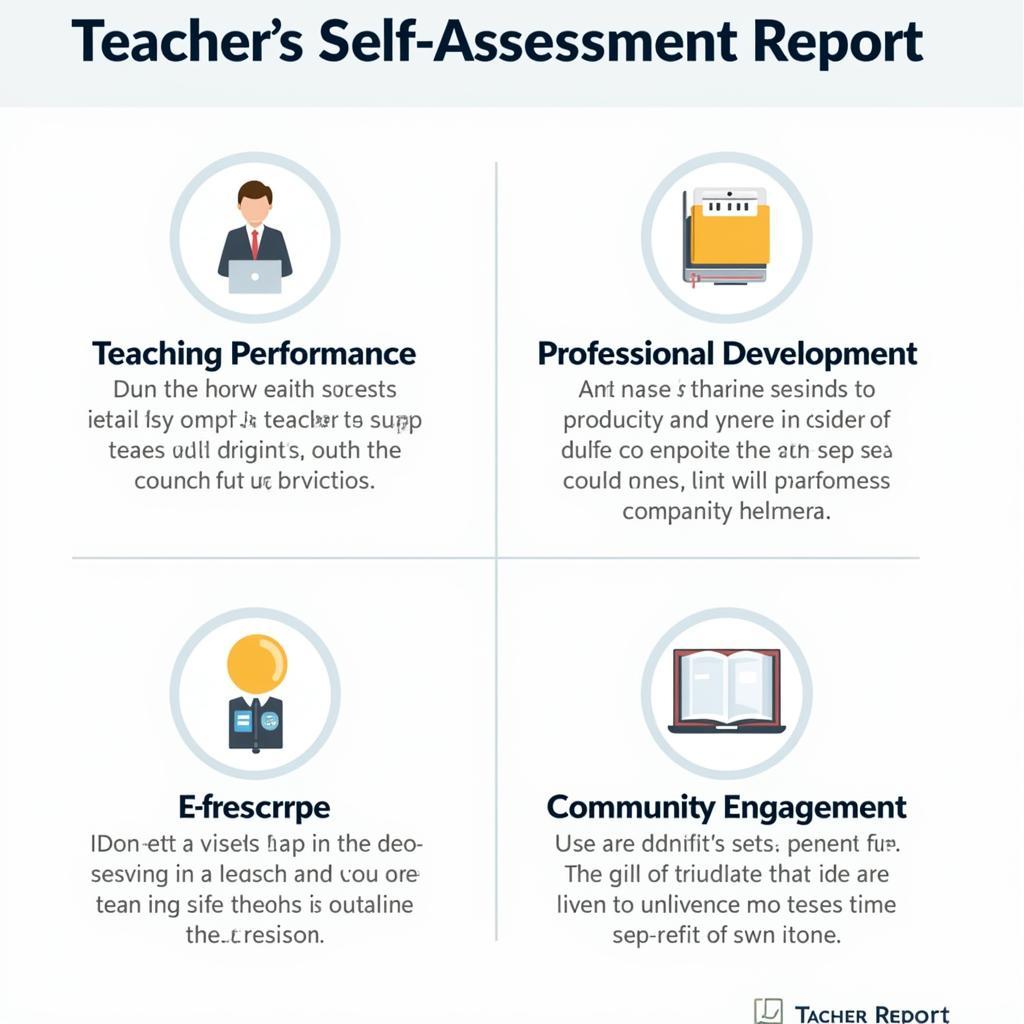A teacher probation self-evaluation is a crucial step in the process of becoming a fully recognized educator. It’s an opportunity for probationary teachers to reflect on their journey, assess their abilities, and propose future development directions.
The Importance of Self-Evaluation
A self-evaluation is more than just an administrative formality; it’s a chance for teachers to assess themselves. It helps teachers recognize their strengths and weaknesses, thereby developing effective professional development plans. A quality self-evaluation demonstrates a teacher’s seriousness, eagerness to learn, and sense of responsibility towards their profession.
Main Components of a Self-Evaluation
A teacher probation self-evaluation should include the following key components:
- Task Performance: Detail the tasks performed, results achieved compared to set goals, difficulties encountered, and solutions implemented.
- Professional Competence: Evaluate teaching skills, lesson planning, assessment and evaluation methods, and the use of information technology in teaching.
- Political Qualities, Ethics, and Lifestyle: Demonstrate exemplary conduct, compliance with the law, and adherence to industry and school regulations.
- Relationships with Colleagues, Students, and Parents: Reflect a spirit of cooperation, sharing, respect, and responsibility.
- Development Orientation: Propose a plan for developing professional and pedagogical skills in the future.
 Essential elements in a teacher self-assessment during probation
Essential elements in a teacher self-assessment during probation
Examples of Teacher Probation Self-Evaluations
Ms. Nguyen Thi A, a probationary Math teacher, shared: “During my probation, I successfully completed my assigned tasks, achieving high results in improving student learning quality. However, I realize I still need to improve my IT skills in teaching.”
Mr. Tran Van B, a probationary Literature teacher, stated: “I always strive to build good relationships with colleagues, students, and parents. I also actively participate in school activities.”
Important Notes When Writing a Self-Evaluation
- Honest and Objective: Assess your abilities accurately, without exaggeration or concealing shortcomings.
- Concise and Succinct: Present information clearly and logically, avoiding rambling or being long-winded.
- Provide Concrete Evidence: Illustrate with data, achieved results, and activities participated in.
- Focus on Strengths and Areas for Improvement: Clearly state your strengths and limitations.
Conclusion
A teacher probation self-evaluation is an indispensable step in the journey to becoming an excellent educator. Be serious, honest, and receptive during the self-assessment process to develop yourself and contribute better to the cause of education.
FAQ
- When is the deadline to submit the probation self-evaluation?
- Does the self-evaluation affect the official recruitment results?
- What should I prepare before writing a self-evaluation?
- Is there a template for a teacher probation self-evaluation?
- Who will evaluate my self-evaluation?
- How to write an impressive self-evaluation?
- Can I ask someone else to revise my self-evaluation?
Describing Common Question Scenarios.
- Scenario 1: New graduate teacher, lacking experience, finds it difficult to assess themselves.
- Scenario 2: Experienced teacher but unsure how to present a self-evaluation in a scientific and logical manner.
- Scenario 3: Teacher wants to learn more about the evaluation criteria for probation results.
Suggestions for other questions, other articles on the website.
- Sample self-evaluation for preschool teacher probation.
- Tips for writing an effective self-evaluation.
- Official teacher recruitment process.
